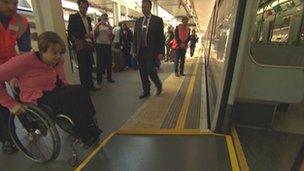Plans to raise access to bus stops and Tube stations
- Published

Up to £18m is to be invested in step-free access at 95% of London's bus stops by 2016, Transport for London (TfL) has said.
About 70% of stops will have access by spring 2013, rising from the current 65%. Another £50m will be spent on training drivers and staff.
A further 28 stations on the Tube and London Overground network will become step-free over the next decade.
Disability charities said the upgrades will make "a real difference".
More than 1.3 million journeys in London are made by disabled people every day.
In addition to increasing the number of accessible stations and bus stops, TfL will also keep the manual boarding ramps at 16 stations - to bridge the gap between platforms and trains.
TfL said it is also working towards creating a combined Tube and mainline map showing step-free access stations in London and will review its signage across the network.
'Travel independently'
By 2014 all 53 trains on the Hammersmith and City Line will be made accessible and by 2016 the District line will see 80 new trains with dedicated wheelchair space, low floors and wider doors.
London Mayor Boris Johnson, said the city had "the most accessible transport network in the country".
"But it's not perfect and we must go further," he said.
More needed to be done to make "thousands more bus stops in London accessible" while "lobbying for more money from the government to help us deliver a network where every Londoner feels that the transport network is their network", said the Mayor.
Fazilet Hadi, of the Royal National Institute of Blind People, said: "Initiatives such as practical disability awareness training for staff, audio and visual announcements on buses, passenger assistance on the tube and travel mentoring, are a necessity for disabled people to travel independently."
Faryal Velmi, director of Transport for All, said "involving disabled and older people in the training of transport staff and investment to make 95% of bus stops accessible will make a real difference to our ability to get out and about with freedom and independence".
- Published10 September 2012
- Published28 August 2012
- Published12 July 2012
- Published3 October 2011
- Published26 January 2009